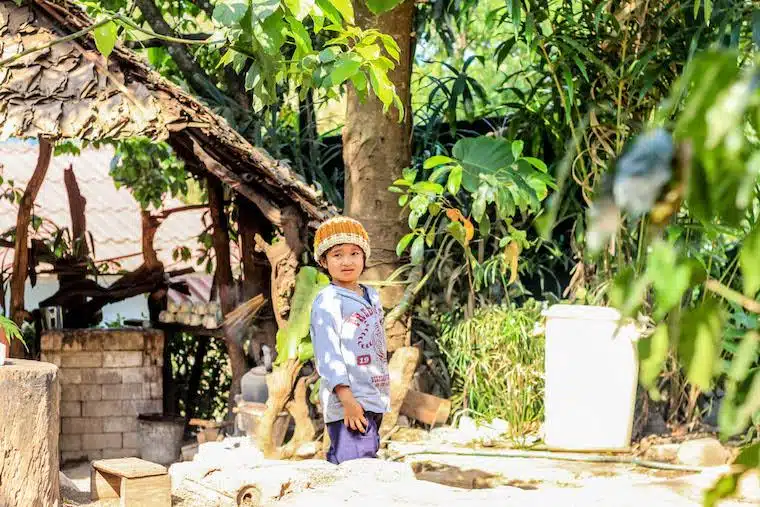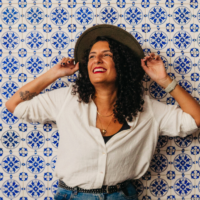José personally welcomes visitors to Mae Klang Luang Coffee, an organic coffee farm in the surroundings of Chiang Mai. He is also responsible for selecting, grinding the beans, and serving fresh Arabica coffee to customers waiting at the rustic wooden tables at the restaurant.
The product grows using organic and traditional techniques in the village of Mae Klang Luang, a small community of the Karen people, descendants of native peoples from Burma who migrated to Northern Thailand centuries ago.
The village, located within the Doi Inthanon National Park near Chiang Mai, is one of the many examples of tribal settlements that have benefited from the Royal Project, an initiative conceived by King Bhumibol Adulyadej in the 1970s that helped transform this region.
Visit the Doi Inthanon National Park with a guided tour. More details here!

Today, covered in flowers and diverse organic plantations, the fields stretching between the idyllic mountains of Northern Thailand were once very different. Until the second half of the 20th century, the region known as the Golden Triangle, which spans the border area with Laos and Myanmar in Chiang Rai province, was famous for its opium production and the misery of its tribal communities.
Although the consumption of narcotics was banned in the country in the 1950s, it is estimated that, in 1970, the tribes collectively produced about 200 tons of opium per year. Poppy cultivation and the extraction of its juice were, for decades, the primary source of income for these populations. Still, most of the profit ended up in the hands of traffickers, who left behind poverty and soil devastated by successive burnings used to open cultivation space.
The Royal Project and its impact on people’s lives
During a visit to his winter palace, the king decided to investigate this situation more closely. He realized that small peach plantations were surviving alongside the poppy fields. The fruit, perfectly adapted to the mountain climate, could be sold at a good profit margin.
This realization was the trigger for the creation of the Royal Project, which consisted of encouraging the replacement of opium plantations with organic food production and the recovery of the ecosystem devastated by years of predatory activity. This initiative thus created a sustainable source of income, increased family profits, and freed the population from dependence on traffickers.


The first development center of the Royal Project was established in Doi Ang Khang in 1969 to develop and educate farmers about cultivation techniques and conservation. The project expanded throughout the north and northeast of the country and today includes 38 development centers spread across the provinces of Chiang Rai, Chiang Mai, Mai Hong Son, Lamphun, and Phayao, in addition to expansion programs to other regions of Thailand.
It is estimated that about 170,000 people in 288 villages have benefited from the Royal Project. Agriculture remains the main engine of local economies, but incentives related to the project have also been applied in crafts, health, education, research, preservation of watercourses, and revitalization of forests.
All products of the Royal Project are certified by the national quality control and receive an identification seal when put up for sale. The government benefits restaurants that use these products, strengthening the project, developing the local economy, and ensuring production distribution.

How to Visit Mae Klang Luang by Car or on Foot
The easiest way is by car. Ask a driver in Chiang Mai to take you there. Mae Klang Luang is just 80 kilometers from the city center.
Since it is located within the park, many people usually combine a day trip to the Doi Inthanon temples, the highest point in Thailand. The journey, filled with green landscapes and flowered fields, includes lunch at restaurants participating in the project. Once inside the park, you can continue to the village by car or take a 3-kilometer hike.
The trail from Doi Inthanon to Ban Mae Klang Luang is the same path as the ‘Pha Dok Siew Waterfall Nature-Exploring Path’. This means that to go to Ban Mae Klang Luang on foot, you must first pass through the Pha Dok Siew waterfall. You will also need a local guide, which can be hired in Chiang Mai or at the park.

How to Visit Other Royal Project Farms in Thailand

Like the Mae Klang Luang coffee, other communities that benefited from the Royal Project have found community-based tourism as an alternative source of income.
From small shops to buy and consume products grown in the communities to the sale of handicrafts and the possibility of staying in typical houses – this is an opportunity for travelers who would like to have closer contact and learn about the culture, language, and tribal way of life.
There, you will have the chance to wake up in a typical house of the region, with the aroma of local coffee, and the opportunity to learn some words in a tribal dialect with the residents. Check it out here.
And if you are the type who loves to get hands-on, some farms even offer workshops where you can learn sustainable agriculture techniques. It’s an incredible way to understand the positive impact of the Royal Project on local communities.
As they are located in rural areas, many are only accessible by car or private tours from travel agencies. But don’t worry; visitors in Chiang Mai will have no difficulty finding operators that offer this type of tour. You can even book your transfer in advance here.
*This article was originally published on 360meridianos.
Editor of Yes, Summer! I am a Brazilian journalist, writer, and digital nomad. I have been traveling the world, telling stories, and tasting local beers since 2010. I am the co-founder of 360meridianos, a reference in travel writing in Brazil, and author of the newsletter Migraciones. On social media, I'm always reachable at @natybecattini.
